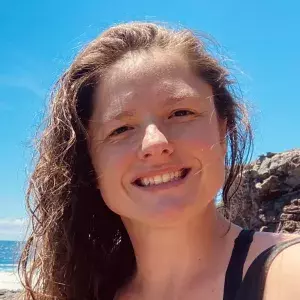Dr Catherine Grasham
Senior Research Associate
Profile
I am a critical development geographer leading work to advance social equity in water, hygiene and health systems, with specialism in household water security in sub-Saharan Africa. Currently based in the FCDO-funded REACH water security research programme, I have worked across science-practitioner partnerships for over a decade with governments, donors and development organisations including WaterAid, Oxfam GB, UNICEF and WHO.
I am passionate about policy-focussed research that supports just social transitions towards a fairer world within the growing climate crisis.
Current Research
My research addresses the interconnectedness of water, politics and human development with a focus on highlighting the voices and values of marginalised and/or vulnerable people affected by poverty.
Equitable methodological approaches
I am in a team developing new methodological tools to embed decolonial approaches in qualitative, quantitative and participatory social research methods. In 2021, I led a participatory action research project, a photo-voice project in Fentale, Ethiopia (see a video or listen to a podcast episode for more information). Since then, I have been involved in scrutinising ethical practices in participatory research with the OX-BER (Oxford-Berlin) participatory research group, a cross-country, inter-disciplinary collaboration of researchers using participatory research approaches.
Political ecology approaches to just transitions
I am leading a package of political ecology analysis research in the REACH-WISER project to inform just transitions to water security in Ethiopia, Kenya and Bangladesh. This work informs politicised approaches to improve efforts towards SDG 6 (some more thoughts on this in a Nature article, here). Working with local and international NGOs, as well as country governments at different levels, this work aims to have transformative impact.
Fieldwork welfare and ethics
I am passionate about improving fieldwork welfare and ethics through connecting researchers, training and lobbying. In 2019, I founded the Oxford University Fieldworkers’ Network – a university-wide Network of more than 200 staff & students – to connect fieldworkers and signpost to opportunities in the university and beyond. As an EDI Associate at the divisional level, I am advancing the idea of “Mental Health Preparedness for Fieldwork” as a normal part of fieldwork preparation. In efforts towards this, I co-lead trauma-related safe space workshops and mental health in fieldwork training.
In 2022, I led the development of Oxford University’s Code of Conduct for Ethical Fieldwork pushing the academic culture to go beyond formal ethical procedures & recognise the importance of engaging with crucial, but often overlooked, fuzzy ethical fieldwork issues.
Research impact and public engagement
The REACH programme’s stories of change demonstrate the wide-reaching research impact that I have been involved with since 2017. I sit on SoGE’s Engagement and Impact working group which shapes the departmental strategic direction for impact and engagement with research.
Through art-science collaborations, I often take creative paths to research impact. I sat on the steering committee for the development of REACH’s Fair Water? exhibition at Oxford University’s Museum of Natural History (running Nov 2023 – Sept 2024). I have used photography and photo-sound exhibitions for public engagement with my research. In a unique music-science collaboration, an original orchestral piece was composed by Oxford-based musicians, inspired by my research, and recorded by the Orchestra of St. Johns (listen here: Reaching Water).
Teaching and Supervision
I am part of a team spear-heading new initiatives for teaching on research ethics for all MSc and DPhil students in SoGE. I co-designed and co-lead a workshop to provide a space for critical discussions on a variety of issues in research ethics from data access and fieldwork, through to publishing and dissemination.
I teach, supervise and mentor students on the MSc in Water Science, Policy and Management, which includes a half-day Water Safety Planning role-play game (developed by the IHE Delft Institute for Water Education) to bring to life the real-world politics of water-related decision-making.
I co-lead delivery of an MSc elective called Water Justice. Students are introduced to the critical lens of water justice and various case studies from across the world. Students consider structural injustices and historical legacies with an intersectional lens. With welfare and praxis in mind, students explore how to adopt water justice as an ethos & reflect on the role of researcher as activist: what is within our power to change, and how can we stay healthy with the reality of injustices that we cannot change? How can we take just approaches to knowledge production?

